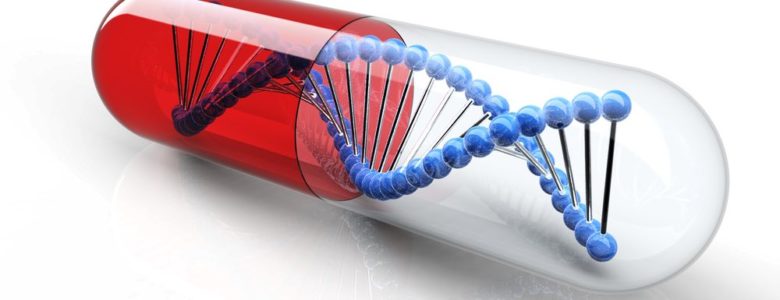
Gene therapies: who profits?
It was science fiction that we would be able to intervene in human DNA to cure diseases. But today, gene therapy is a reality. Scientists are able to manufacture and inject a complex machinery of molecules guiding changes to our DNA that can cure very specific cases of blindness, blood disease and even certain types of cancer. If the spectrum of applications is so far narrow, more gene therapies are on the way. Millions in taxpayers’ money was responsible for funding research to mount such an impressive accumulation of scientific knowledge over recent decades and make clinical applications real.
Ideally, the development of a successful gene therapy would bring relief to all those suffering from the disease. But there is one big obstacle to overcome: capitalism. Pharmaceutical and insurance companies fight over the profit from gene therapies. In theory, a single dose would suffice for a complete cure. But, is this a sensible reason to charge hundreds of thousands of dollars for the therapy? Is it aligned with our human values to squabble over the therapy’s price, instead of making sure that every person in need actually benefits from it?
As a response to this commercialization (“profitization”) of publically funded technologies, DiEM25 has developed the Universal Basic Dividend alternative. We have yet to decide on wider health policies: that’s why we need your help. We have a forum and a platform to collectively develop ideas! First step: join us here.
Aris is a member and volunteer of the DiEM25 movement.
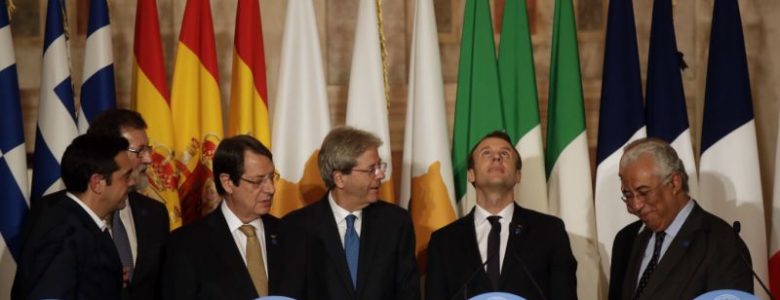
Summit in the EU south: all talk no action?
In a properly functioning democracy, we would endorse discussion and collective action among members. If the European Union was an exemplary democratic organization, then a meeting of some of its countries to discuss solutions to European problems would be more than welcome. But under a malfunctioning bureaucratic establishment that despises democratic processes, such a meeting only reveals its dysfunction, all the more acutely when these same members call for more democracy throughout the European Union.
Based on what the leaders of countries of the European South who gathered told reporters, nothing much happened. They called for more European integration, for more democracy and for better policies in migration. Everything sounded very important but also dully familiar. As always, it would be so much more meaningful if we heard about specific plans for action and initiatives. So is this “South Summit” able (or willing?) to voice an alternative to a German-dominated European Union? Or, Is There No Alternative (TINA)?
At DiEM25, we have dismissed the TINA dogma. Astonishingly, there are many alternatives! Our alternative is the European New Deal. Ambitious? Yes! Achievable? Absolutely. Let’s go!
Aris is a member and volunteer of the DiEM25 movement.
(AP Photo/Alessandra Tarantino)
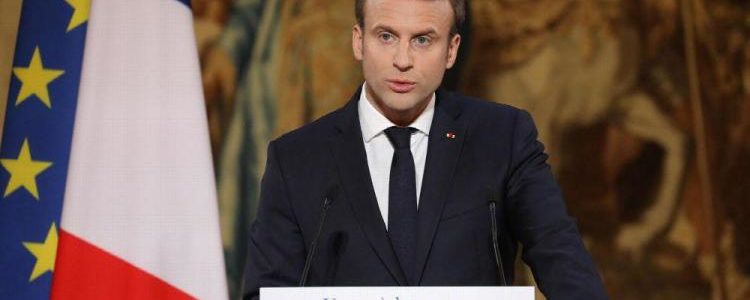
Let’s set the record straight on fake news, Mr President
Mr. President,
On January 4, you used your annual New Year’s speech to the press to express great concern about the circulation of fake news on the Internet.
As a specialist in the field and a committed citizen, I can only thank you for having opened this crucial debate for the preservation of modern democracy.
I must, however, ask you to clarify certain elements of your speech, to dispel some misunderstandings that it may have created and especially invite you to take into account in your reflection, some elements of the global context that promote the nuisance power of tendentious speech, propaganda and fake news.
In your speech, you attribute the recent eruption of fake news in the media field to the following:
“By a fascination for an absolute horizontality, we considered that all words could indeed be equal and that their regulation was inevitably suspect as mere choice”.
adding:
“This is not the case, not all words are equal.”
Now, in the country which you represent, it is established since the Declaration of the Rights of Man and of the Citizen of 1789 that:
“The free communication of thoughts and opinions is one of the most precious rights of man: every citizen can therefore speak, write, print freely, but shall be responsible for such abuses of this freedom as shall be defined by law…”
Let us dispel misunderstandings, Mr President, since, unfortunately, your speech lends itself to misinterpretation, and clarification seems necessary. Can you confirm that in speaking of the “fascination for absolute horizontality,” you are not referring to the principles that inspired the Declaration of Rights of Man and of the Citizen: and that by saying that all words are not equal, you do not mean to say, in the exercise of your functions, that all speakers do not have the same rights of free speech?
As a democrat, I am obliged to teach my students that all words are equal, that all speakers have the same right to speak. However, I agree with you on one point: it is true that not all speeches are equal. Our democratic life is defined in its very essence by the exercise of a continuous discursive practice that allows citizens to collectively construct epistemic, moral and deontic judgments. It is, indeed, through speech, or rather through ‘speech acts’, that we manage to decide together what is true, what is right and what it is necessary to do. However, for the democratic process to be honest, correct and useful, the discourses that animate it must have an unavoidable characteristic: they must be falsifiable. A falsifiable discourse is a precise discourse, where referents are identifiable, where all the predications are openly supported by the speaker or attributed to clear sources, where all the argumentative relations are explicit. These characteristics, which relate public discourse to scientific discourse, allow discourses to be contradicted through argumentation – rather than authority – and to be overtaken, if need be. These two properties allow public debate to remain both healthy and lively.
In this perspective, your opposition between the authority of the journalist and the unreliability of “any blogger” can sound simplistic.
The authority of a speaker, Mr. President, does not derive from his social status, but from his effort to be honest.
There are unofficial discourses constructed with all the responsibility demanded and official speeches that do not fulfil the conditions of acceptable speech in public debate; the evidence, Mr. President – I’m sorry to say – is in your very address to the press. Although official, your speech is not exempt from the typical vices of toxic discourse: you refer, for example, to “a strategy and a strategy financed” by “powers” in “certain illiberal democracies” as the source of the spread of fake news. By saying that, Mr President, you create alarm without taking responsibility. The object of your accusations being unclear, no one will ever falsify your speech, but you will achieve the effect of making us feel threatened.
Another example from your speech: you say that the rise of fake news:
“Is very often used by powers that somehow take advantage of the weaknesses of democracy, its extreme openness, its inability to sort, to prioritize, to basically recognize a form of authority. ”
In saying that the extreme openness of democracy is a weakness, Mr President, you allow us to infer your intention to limit this openness, without however taking responsibility for what you said. The Democrats will not be able to accuse you of having made liberticidal remarks, but the pathway to liberticidal speech acts will have been opened.
I do not take a position, Mr President, on the nature of the measures you have announced: others have done so by showing that they add nothing to the existing legislation, that the very notion of ‘fake news’ is vague, ambiguous, and lacking in precise reference; and that therefore any prohibition on the dissemination of information based on the idea of fake news is incompatible with international standards defining the restriction of freedom of expression.
However, I will allow myself a few general considerations: you open, by tackling this subject, a fundamental debate of our time, the debate on the government – or governance, as we have been saying for some time – of the digital revolution. This is a broad and complex debate about a radical change affecting our entire civilization, not just the manipulation of the electoral game that you have placed at the centre of your speech.
As a citizen, I wonder if we can tackle this issue by continuing to ignore the fact that we have let the industry manage the digital revolution, that we have allowed the giants of the web to gain monopoly positions by feeding them citizens’ data that politics did not want to protect; that we do nothing against the filter bubbles that manipulate and pervert public debate even more than the spread of fake news; that we allow digital businesses to dictate the selection, format, design, framework, and timing of information dissemination (whether false or true); that we have not been able to create the right conditions to rethink the education of young people and continuing education in the light of this revolution, leaving citizens bereft of any critical thinking or critical tools to meet the impact that this radical change has on their personal lives as on their public life.
DiEM25, the movement to which I have the honour and the pleasure of belonging, confronts all these themes within the general framework of a reflection on the democratization of the economic, ecological, cultural and strategic foundations of our society. And we do it by adopting a participative democracy approach. We consider that in the effort to democratize the foundations of our society, an effort that you seem to support, all citizens must be involved in the public debate, not only because, as our fathers taught us, all words are equal, but because all the words, or better still, all the responsible words, are necessary to this end.
DiEM25 is committed to marshal these words, Mr. President: I very much hope that you will be able to listen to us.
In asking you to accept my New Year message, allow me to close by wishing you the opportunity our motto recalls, to “pick the moment” that makes you a true defender of democracy: Carpe DiEM, Mr. President.
Paola Pietrandrea
Linguist
Member of DiEM25’s Coordinating Collective
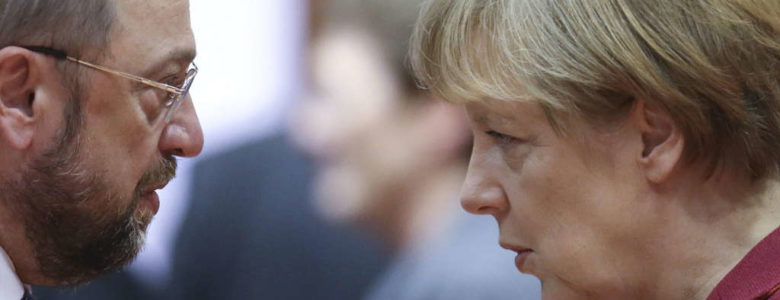
One more round in Germany, as Europe awaits
The political drama in Germany is not over. CSU/CDU and SPD have just officially started the negotiations to form another grand coalition. However, this long period of uncertainty has resulted in a fall in nationwide support for a coalition and also for Angela Merkel herself. There are voices arguing for the end of the Merkel era. Merkel is, indeed, on the defensive. On the other hand, we are skeptical about Schulz’s argument for a “United States of Europe” by 2025.
We believe that the way forward is not through closed borders and establishment-centric policies; that’s why DiEM25 has developed a European New Deal, a response to xenophobia and European disintegration. Germany has the capacity to transform Europe for good in order to build a robust pan-European democracy. We would very much like to see Germans once again succeed in deploying their capacity for rationality and setting an example for everyone.
You can join DiEM25 here or participate in one of the burgeoning local groups (DSCs). Germany has the most!
Aris is a member and volunteer of the DiEM25 movement.
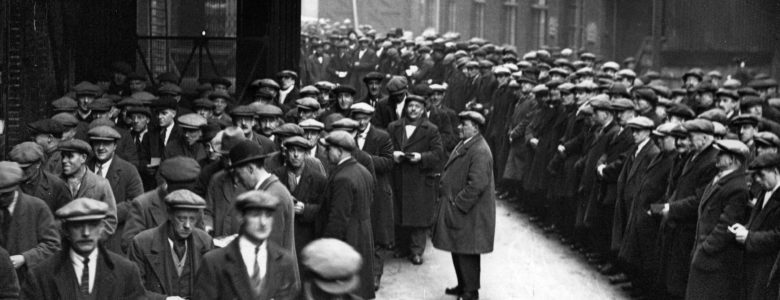
Are we living through a new “Weimar era”? Lessons from the past and constructive resolutions for our future
The infamous “March of Independence” that took place in Warsaw on November 11, last year, has raised once again the question of whether we are living through a new version of the 1930s. While commentators, scholars and politicians are making extensive use of this historical analogy, its meaning remains ambiguous. It has been argued that progressives should drop it altogether, since it risks fostering a conservative interpretation of the current economic and political crisis, which identifies the threat posed to democratic societies as existing in the very demos itself.
However, the problem lies less in the analogy than in the way in which the latter is framed. Although it can be used to uphold technocratic policies, it can also serve democratic and progressive purposes. DiEM25’s proposals, such as our ambitious “European New Deal”, are precisely the living proof that the lessons from our dark past can be learnt and transformed into constructive resolutions for our future. Now, it is time to prepare for translating such resolutions into action, starting with the next EU parliamentary elections.
As widely reported by media outlets worldwide, tens of thousands of far-right nationalists and neo-fascists flooded the streets of Warsaw on Poland’s Independence Day. Demonstrators displayed old fascist symbols and chanted slogans such as “We want God”, “White Europe of brotherly nations”, “Remove Jewry from power”. Such a march is the clear sign that Europe is facing a serious threat posed by the growth of far-right movements, which has been so far downplayed, or outright ignored, both by the conservative and the liberal wings of the establishment.
Moreover, the rise of neofascism and far-right extremism cannot be discounted as a symptom of the immaturity of East European democracies, given that West European ones have proved not at all immune to the same menace. Since this surge is clearly related both to the “Great Recession” into which the world economy has sunk since 2007 and to the crisis that has been crippling the very foundations of modern liberal democracies in recent years, we are left to wonder whether “we are living through another 1930s”. If so, in which sense is this historical analogy correct?
Elite syncopations
DiEM25 is built precisely on the assumption that the steady disintegration of the European Union is threatening to push our continent back to those years. Such an analysis seems now commonplace, as commentators, scholars and politicians have started to make extensive use of it. It has been argued, for instance, that the election of Donald Trump has brought the USA into a “Weimar phase” in their history. However, as argued by Daniel Bessner and Udi Greenberg in the Jacobin Magazine, seeing our own predicament “through the lens of the Weimar Republic, then, comes with considerable peril”, since this might fuel élitist and technocratic responses, based on the assumption that “democracy’s survival depends on restricting the people’s power and on forming an unelected, bureaucratic elite shielded from public scrutiny”.
Such an assumption is clearly spelt out in Andrew Sullivan’s short essay on why America is ripe for tyranny. In this essay, Donald Trump is depicted as a quasi-fascist rabble-rouser whose success is to be imputed to the undoing of the “large, hefty barriers between the popular will and the exercise of power” that had been constructed by the Founding Fathers, as well as to the frustration inflicted on white working-class Americans by the excessive demands of “minorities”. Therefore, instead of highlighting the dangers posed by the insurgence of neo-fascist movements, this conservative interpretation of the “back to the 1930s analogy” ends up amalgamating those movements with all other expressions of discontent with the current status quo. Such a narrative, however, is both analytically fallacious and politically misleading, and this for four main reasons.
Four arguments from Hitler and Mussolini to Arendt and Marx
First, historically speaking, the Nazi regime cannot be viewed as the result of an “excess of democracy”, since Adolph Hitler never received an absolute majority in the ballots and his rise was made possible by the support of conservative elites, who were willing to use him as an extreme measure against the “Red peril”. The same could be argued for the rise of Benito Mussolini in Italy: the March on Rome, which persuaded king Victor Emanuel III to appoint him as Prime Minister, was the culmination of a mobilization of fascist “black shirt” squads against left-wing parties, trade unions and workers’ councils, while his first cabinet included “nationalists, two Fascist ministers, Liberals and even… two Catholic ministers from the Popular Party”.
Second, such a narrative overemphasizes the mass support that neo-fascist and far-right movements can gather. The problem with those movements lies less in their electoral and militant strength than in the fact that their ideas “are seeping into the mainstream”, thus pushing rightward the entire political spectrum.
Third, as Bessner and Greenberg further observe, the thinking that underpins this interpretation of the insurgence of neo-fascism risks exacerbating, rather than to mitigating, the threat that it is supposed to avoid: “while xenophobia and racism remain critical to understanding populism’s appeal, the sense that people have no control over their own government and that too much power is concentrated in the hands of unaccountable elites also fuels popular outrage”.
Fourth, such a use of the “back to the 1930s analogy” exclusively focuses on the pathological and conjunctural aspects of fascism, while overlooking the “structurally” fascist, or even Nazi, features of our own democratic societies. As Hannah Arendt argues in Eichmann in Jerusalem, there exist very plausible reasons why we should fear “a repetition of the crimes committed by the Nazis”, the most important of which is the fact that our societies constantly render large sections of their populations “superfluous”. Just to name two examples, on one hand, technological progress is threatening to exacerbate what Karl Marx deemed to be the human cost of economic production “under the rule of private property”: “production of too many useful things produces too large a useless population”; on the other hand, the complex factors that are causing the so-called “refugee crisis”, which is in fact a structural feature of the current state of the world, also contribute to transforming human beings into “superfluous things”, which must be allocated their place in a “sustainable” manner.
Two resolutions for the future
Should we thus conclude that any analogy between our predicament and the crisis of the 1930s is doomed to be misleading? According to Bessner and Greenberg, progressive forces should retire all references to the Weimar Republic and the 1930s. In their view, this is a necessary precondition for persuading people to reject “technocratic politics and the close collaboration between the government and economic elites”, while building “viable coalitions” committed to “distributionist policies” and to addressing “the needs of the many”.
However, they overlook the two main lessons that those analogies can still teach us. First, it would be dangerously delusional to expect that the total collapse of the European Union would bring forth a radical, progressive alternative to neo-liberalism. Quite the contrary, it could only exacerbate the structurally fascist features of our imperfect democratic order. That is why, for a start, the European Union must be saved from itself: “Not out of love for European capitalism, for the eurozone, for Brussels, or for the European Central Bank, but just because we want to minimize the unnecessary human toll from this crisis”.
Second, our current predicament requires solutions that must both be bold and pragmatic, such as DiEM25’s proposals for a “European New Deal”, which combine the lessons of Roosevelt’s New Deal with the necessity of tackling such pressing issues as the ecological transition and a bold “post-capitalist” outlook on the future. Moreover, such proposals are tightly related to the political effort to identify a “third space”, beyond the establishment (both liberal and conservative) and national-populist forces, which aim to recover a past that never existed in the first place, in order to foster democratic control and participation across the whole Europe.
For all those reasons, it might be argued that the problem does not lie in the analogy itself, but in the way in which the latter is framed. Although it can be used to uphold technocratic policies, it can also serve democratic and progressive purposes.
DiEM25 is precisely the living proof that the lessons from our dark past can be learned and transformed into constructive resolutions for our future. Now, it is time to prepare for translating such resolutions into action, starting from the next elections to the European Parliament.
Nicola Bertoldi is currently pursuing a PhD in history and philosophy of science at the University of Paris 1 and is an active member of DiEM25.
Photo: Labourers queue for work at the London docks in 1931. Photograph: Fox Photos/Getty Images.
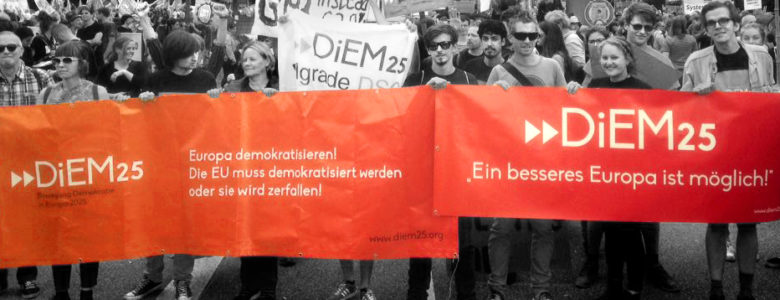
DiEM25’s 2018 will prepare for TINA’s demise in May 2019
Almost two years ago, we got together under DiEM25’s broad umbrella to challenge old-style politics, to shatter TINA – the Establishment’s ‘There is No Alternative’ doctrine – at the pan-European level, to turn Europe’s democratisation into a radical, realistic, uniting project.
2017 was an awful year for European democracy. But it was an amazing year for DiEM25. We:
- Rallied tens of thousands of people in cities including Amsterdam, Athens, Brussels, Berlin, Dublin, Hamburg, London, Paris, and Rome, and toured the breadth and length of Greece and Italy, demonstrating that There is An Alternative; that Another Europe Is Already Here!
- Nurtured our activists. There are now 70,000 DiEMers in almost every country on the planet!
- Launched and pushed specific campaigns to expose the Establishment’s worst abuses – and we just filed a lawsuit against the European Central Bank to force them to release #TheGreekFiles
- Launched our European New Deal, our concrete social and economic Policy Agenda, crowd-sourced from DiEMers and experts across the world
- Influenced elections with our interventions, like in Germany, France and the UK, and supported/partnered with candidates or parties that embraced them, like in Catalonia, Zagreb, Denmark and Poland.
- Welcomed progressive leaders to our movement, like Naomi Klein and Richard Sennett
- Kickstarted the process for taking the European New Deal to a polling station near every European – at the Volksbühne Theatre, in Berlin
- Began electing our Coordinating Collective
- Presented the Real State of the Union – in Brussels, at the Bozar Theatre
- Set in motion the ‘Not Just Another Political Party’ endeavour
- Elected our first National Collectives, taking to new levels our ambitious experiment in grassroots transnational democracy – with all members (despite nationality) voting for different national collectives
And we did this by working our hearts out, supported only by you, our members, with modest donations!
2018 will be another difficult year for European democracy. So, let’s make 2018 DiEM25’s year. Let’s work hard to:
- Establish our electoral wing as a significant transnational political force across Europe, in preparation for the May 2019 European Parliament Elections
- Deepen democracy within our movement
- Make DiEM25 the first movement that uses the electoral process to change Europe, rather than allowing the electoral process (the old-style grubby way of ‘doing politics’) to change us
2018 will be no ordinary year. Recently we decided with a huge majority of our members that we should be able to compete in elections to bring our Progressive Agenda to the people of Europe. Our focal point is, naturally, the European Parliament Elections in May 2019.
That means we have just 17 months to make an impact! During these 17 months we must:
- Grow our activist base like never before
- Finalise our Progressive Agenda and adapt it to specific countries, regions and cities
- Consolidate alliances with progressive partners who stand behind our proposals — or run for elections on our own.
In short, we need to build a political machine that will make electorates in 2019 sit up and take notice. And do this while keeping that ‘machine’ subservient to our movement; in accordance with our collective decision that DiEM25 does not become a political party but, instead, creates political/electoral wings so as to use elections as one of its tools for bringing change about across Europe.
It’s only people like you, our committed members and activists who can do this.
Not a DiEM25 member? If there is a DiEMer in you, a few clicks can make a world of difference! Here are a few ways for you to get involved:
- become a member
- make a donation
- volunteer
- join your nearest DiEM25 local group of activists
Let’s make 2018 the springboard that will allow us and our allies to send our loud message both to the Deep Establishment and to the militant, xenophobic populists: “We’re coming for you!”
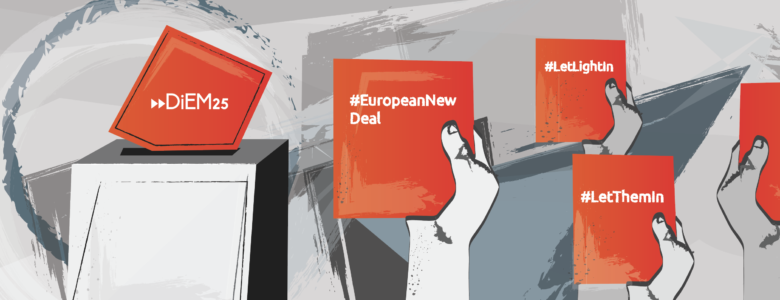
These are the DiEMers who will lead our National Collectives in Belgium, Germany, Greece and Italy!
DiEM25 members across Europe just elected 48 grassroots activists to lead our movement’s first National Collectives (NCs) in Belgium, Germany, Italy and Greece.
Meet the women and men who have offered to roll up their sleeves to help coordinate our national efforts:
>>Belgium:
– Marie Naass, coordination with Brussels political sphere. Watch Marie’s presentation video.
– Jean-Philippe Steeger, Event Organisation. Watch Jean-Philippe’s presentation video.
– Davide Castro, Media Relations and Communication Strategy. Watch Davide’s presentation video.
– Naila Sebbahi, Social Media Coordination. Watch Naila’s presentation video.
– Diego Naranjo, Coordination with DiEM25 Europe. Watch Diego’s presentation video.
– Erik Edman, Internal Coordinator. Watch Erik’s presentation video.
– Rosita Allinckx, Fundraiser. Watch Rosita’s presentation video.
– Michèle Heyvaert, Administrator/Treasurer. Watch Michèle’s presentation video.
– Niels Wennekes, Membership & DSC Coordination. Watch Niel’s presentation video.
– Joren De Wachter, Policy Coordinator. Watch Joren’s presentation video.
– Guilherme Serodio and Franzis Wimmer, Private and Civil Partnership Coordinators. Watch their presentation video.
– Claire Delstanche, Belgian Political Partnership Coordinator. Watch Claire’s presentation video.
>>Germany:
– Stefan Vardopoulos, Coordination and collaboration with Switzerland, Austria, Liechtenstein and Luxembourg. Watch Stefan’s presentation video.
– Alexander Nitschke, Social Media Coordination. Watch Alexander’s presentation video.
– Fabian Kors, Press Coordination. Watch Fabian’s presentation video.
– Robin Scheben, Writing of press articles and PR statements. Watch Robin’s presentation video.
– Dominik Schlett, Coordination of DSCs and internal NC-Coordination. Watch Dominik’s presentation video.
– Eric Caspar, Membership-Coordination and Network Improvement. Watch Eric’s presentation video.
– Susanne Helfrich-Vardopoulos, Networking between European National Collectives. Watch Susanne’s presentation video.
– Lorin Brenig, Conceptualisation of Events. Watch Lorin’s presentation video.
– K-nut Bänsch, Logistics for Event Organisation. Watch K-nut’s presentation video.
– Kasia and Elisa, Nationwide Cooperations and Partnerships with Experts and Organisations. Watch Kasia’s and Elisa’s presentation video.
– Luisa Barbas, Policy Coordination: Integration of policy work. Watch Luisa’s presentation video.
– Michael Fromm, Intelligence on European Policy and Politics Development. Watch Michael’s presentation video.
>>Greece:
Communications: PR and social media
– Depi Vrettou. Watch Depi’s presentation video.
– Χrúsa Ariádni Kouselá. Watch Χrúsa’s presentation video.
– Kóstas Ntáskas. Watch Kóstas’ presentation video.
Members & DSCs:
– Danae Stratou. Watch Danae’s presentation video.
– Apostolos Gogakos. Watch Apostolos’ presentation video.
– Demetrios Skagias. Watch Demetrios’ presentation video.
Events & Administration:
– Mahi Traka. Watch Mahi’s presentation video.
– Jochen (Joachim Hermann Leopold) Schult. Watch Jochen’s presentation video.
– Thomas Achtaridis. Watch Thomas’ presentation video.
Issues of Politics:
– Yanis Varoufakis. Watch Yanis’ presentation video.
– Konstantina Katmada. Watch Konstantina’s presentation video.
– Fotini Bakadima. Watch Fotini’s presentation video.
>>Italy:
Communication: press, public inquiries, website, creative communication, social media
– Patrizia Pozzo. Watch Patrizia’s presentation video.
– Gianluca Costantini. Watch Gianluca’s presentation video.
– Max Elia Schweigkofler. Watch Max’s presentation video.
Territory: organising members and activists, helping DSCs develop, expanding relations to additional partners and movements
– Anna Fava. Watch Anna’s presentation video.
– Simona Ferlini. Watch Simona’s presentation video.
– Emanuele Dolce. Watch Emanuele’s presentation video.
Choreography: organising events directly and helping DSCs organise events, artistic performances, and overseeing oranisational and logistical issues:
– Laura Pizzirani. Watch Laura’s presentation video.
– Renato Votta. Watch Renato’s presentation video.
– Stefano Bifulco. Watch Stefano’s presentation video.
Agenda: organising editorial work for the webstie; working on adapting DiEM’s European policyto Italy in cooperation wth NC, CC, and Advisors
– Francesca Maurri. Watch Francesca’s presentation video.
– Eleonora Vasques. Watch Eleonora’s presentation video.
– Tommaso Visone. Watch Tommaso’s presentation video.
To the dozens of candidates who did not make it to an NC this time around, we thank you all for participating and hope you’ll continue working with us. DiEM25 needs you and your commitment to make our movement better!
Candidacies to the NCs were open to all DiEMers who adhered to basic criteria like how long they have been a member of the movement, and how much time they could give to working on their NC, among others. Similarly, to ensure transparency and a genuine democratic process, voting was open to members that joined the movement before the elections were announced. Additionally, members’ accounts needed to be verified and active, for them to be able to vote. As with all DiEM25´s internal democratic procedures, all transnational votes had equal value and were anonymised upon being cast. Furthermore, our members voted as per our Organising Principles‘ gender-balance policy.
Visit DiEM25’s Members Area to view the NC elections’ full results.

Candidates to the Catalan Parliament endorse DiEM25's objectives
For the upcoming elections to the Catalan Parliament on December 21st, our members in Catalonia have followed the example of France’s parliamentary elections and Germany’s federal elections and prepared a letter for any progressive candidate to endorse our ideals and objectives, which may be the first step towards a broad progressive alliance in Catalonia.
This is the letter sent to all progressive candidates:
- In Catalonia we have a mobilized and politically active citizenship. We demand greater citizen participation in political decision-making. We will promote maximum transparency in our institutions, according to internationally recognized indicators, such as the publication of all parliamentary, economic, financial, and governmental activity in their websites, ease to access information for citizens, being subject to regular external audits and the establishment of an Ethical and Conduct Code. We will expose the presence and activities of lobbies in the Government and we will protect whistleblowers.
- We want a European Union of human rights that demonstrates strong unity in the accomplishment of all established asylum agreements, that guarantees legal and safe routes, and works to guarantee an appropriate welcome to those who had to flee from their countries. And we frontally reject the fortress EU that engenders death and suffering to those who seek protection, criminalizes the newcomer, and promotes false identity conflicts and the institutionalization of the xenophobic far right.
- We need a new economic policy, a European New Deal, which puts an end to the unworthy power of banking and finance, ends the tyranny of debt, cause of the austerity policies and the impoverishment of many Europeans. Which puts an end to tax havens and financial speculation. An economic policy at the service of an economic system that fosters sustainable production and that guarantees that all the citizens can access basic goods like housing, food, and energy.
- We will work to put an end to the crises of unemployment and deregulation of labor conditions, and that our young won’t be forced to emigrate for a decent wage. We will boost new economic measures that adapt the labor market to the new technological revolution, such as a universal basic income or a reduction in weekly working hours.
- We will take care of our land and our environment, fostering an ecologic transition to stop climate change and revert the damage done by massive pollution. For this reason, we consider fundamental a change in the consumption model towards renewable and sustainable energy sources, the recovery for the citizens of the sources of generation and supply of basic goods and the open access to scientific research.
- We will boost the digitalization of our economy and our public administrations as a tool to develop and empower our society, under the principles of technological sovereignty and respect to individual rights and liberties in the digital environment.
- We will encourage a constituent process in Europe that democratizes the European Union, submitting it to serve the citizenship, and where sovereignty is distributed between the municipal, regional, state, and European levels depending on criteriums of efficiency and closeness to the citizens.
- The Catalonia crisis is a chance for Europe to redefine the concepts of sovereignty, state, and European democracy. We will work to make the voices of regions be heard in Europeans institutions and we will propose a political solution that resolves the Catalan territorial conflict by means of a juridically binding referendum in coordination with the European Union, as long as there is a social majority in votes that proposes it.
Signatories of the letter:
| Name | Party | Position and province |
|---|---|---|
| Elisenda Alamany Gutiérrez | Catalunya en Comú – Podem | 2, Barcelona |
| Marta Ribas Frias | Catalunya en Comú – Podem | 4, Barcelona |
| David Cid Colomer | Catalunya en Comú – Podem | 7, Barcelona |
| Antoni Ribas Bravo | Catalunya en Comú – Podem | 15, Barcelona |
| Montserrat Mompió Gallart | Catalunya en Comú – Podem | 18, Barcelona |
| Marc Martorell Escofet | Catalunya en Comú – Podem | 39, Barcelona |
| Alba Molina Serrano | Catalunya en Comú – Podem | 42, Barcelona |
| César Sierra Noguera | Catalunya en Comú – Podem | 54, Barcelona |
| Miguel Comino Haro | Partit dels Socialistes de Catalunya (PSC – PSOE) | 65, Barcelona |
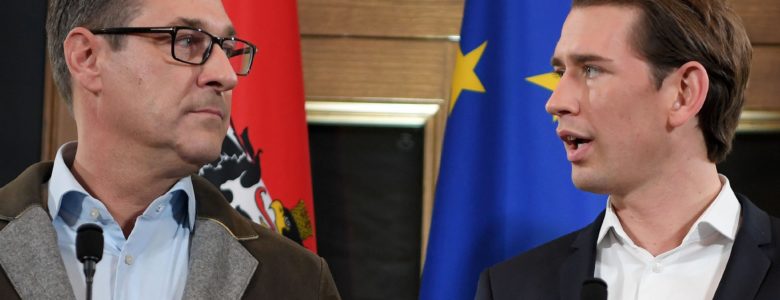
The new Austrian government shows the way… backwards!
The far-right is on the rise. The most recent win was scored in Austria: the country is now in the grip of a government coalition ready to implement its right-wing policies on immigration, including extreme vetting and making it impossible for asylum seekers to feel safe. This is the first time that Europe openly confronts the immigration problem head on. If it succeeds, the Austrian experiment will quickly spread like wildfire across Europe as well as over the Atlantic. In this context, far-right leaders are uniting, and preparing themselves for this future.
We need to take action. Alongside the people who protested in Vienna, we need to make our voices heard. We want an open Europe; not closing its borders to people in need; not pseudo-debating on immigration policies while refugees live under inhumane conditions. We don’t want the far-right to gain momentum, particularly not in the political vacuum left for lack of a strong Germany. At DiEM25, we want to mobilize people and fight for a progressive Europe. Join us and help us change Europe!
Aris is a member and volunteer of the DiEM25 movement.